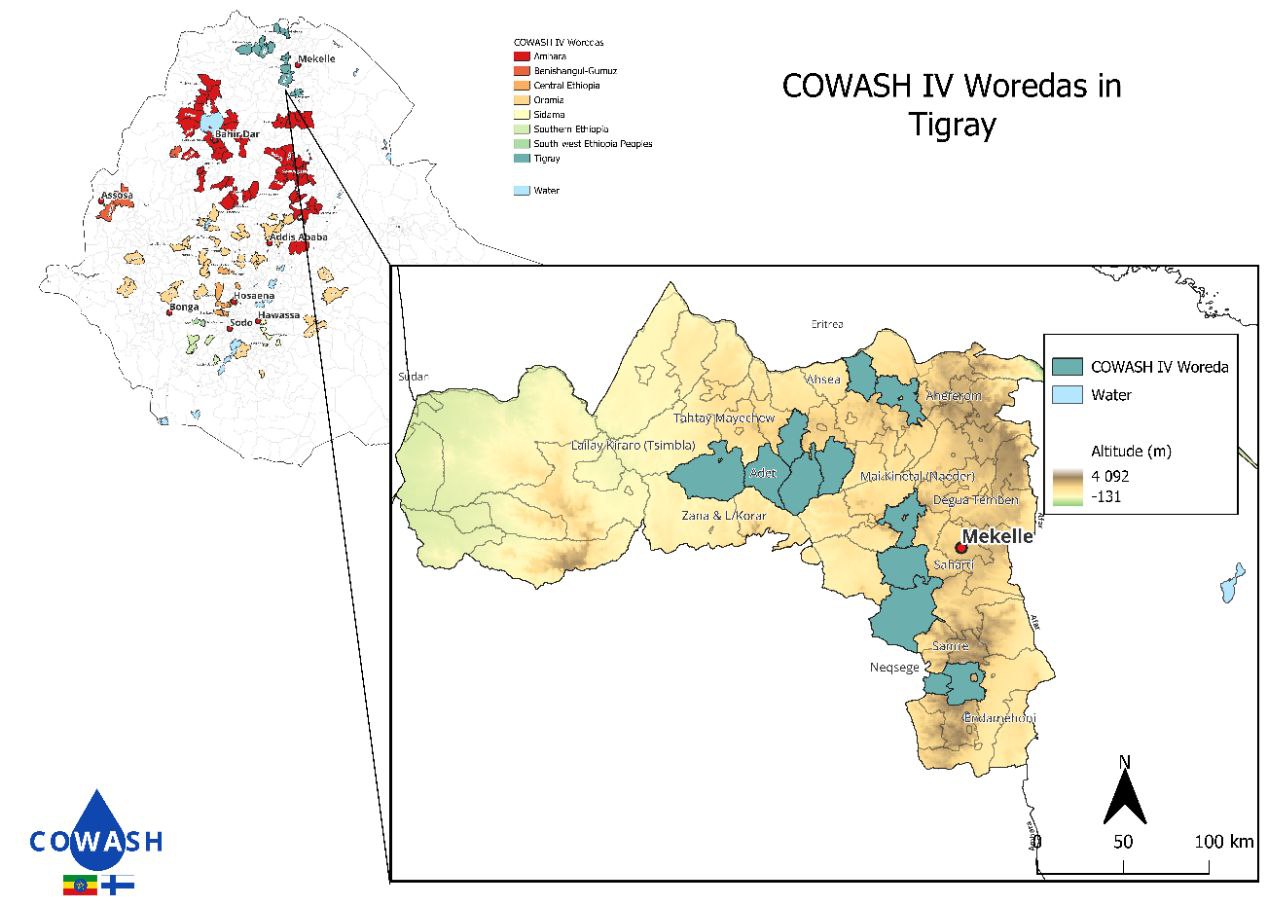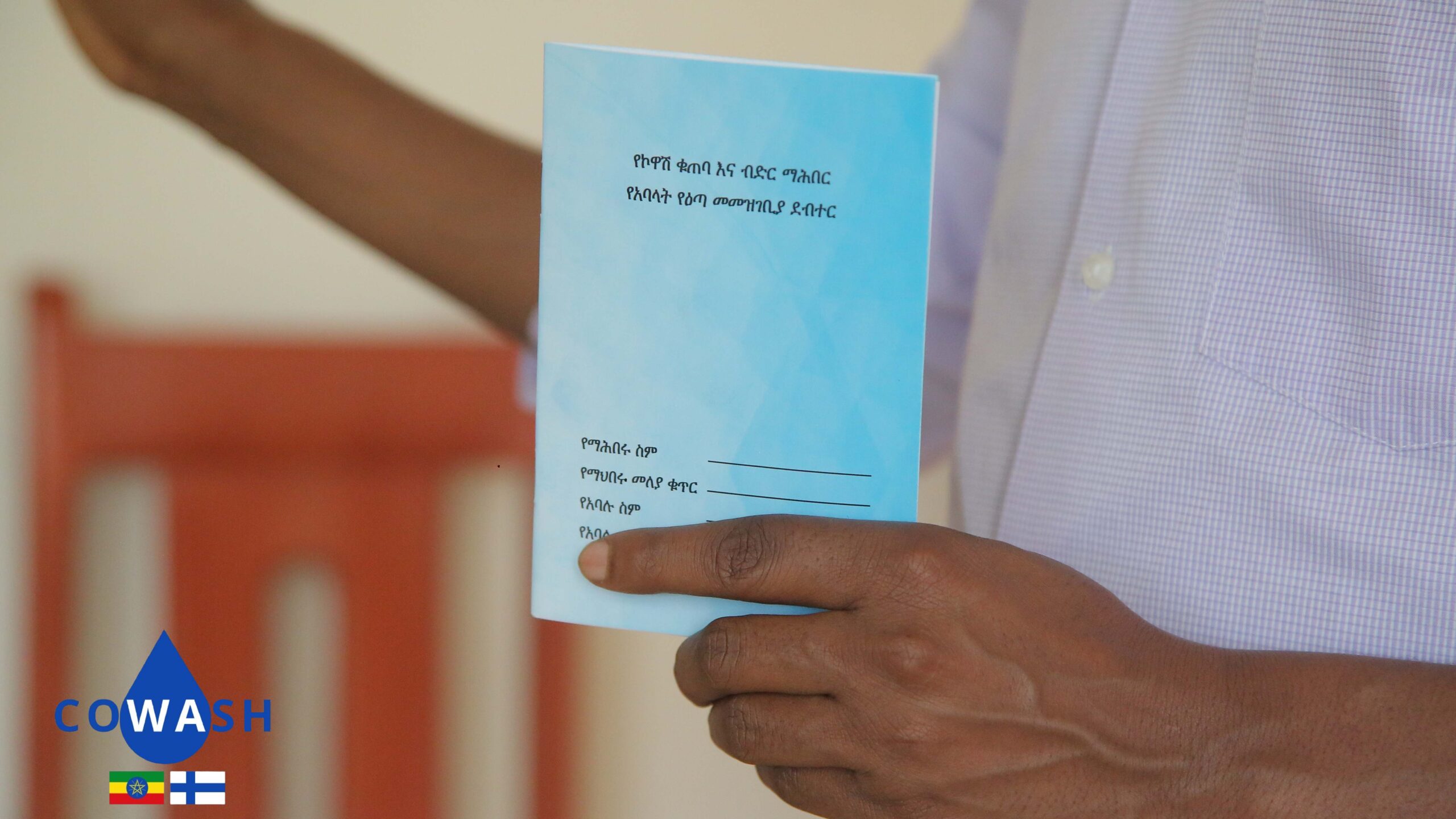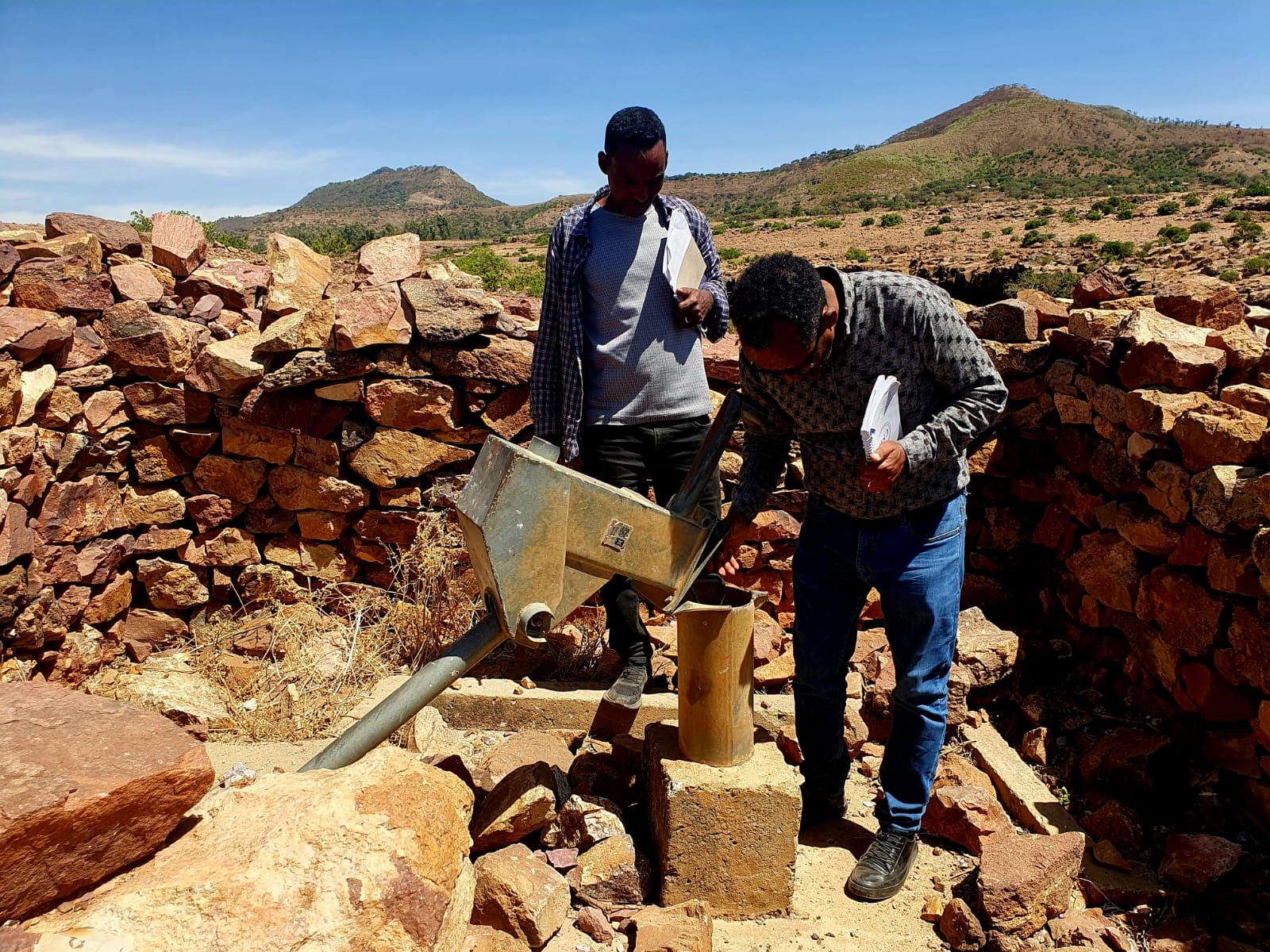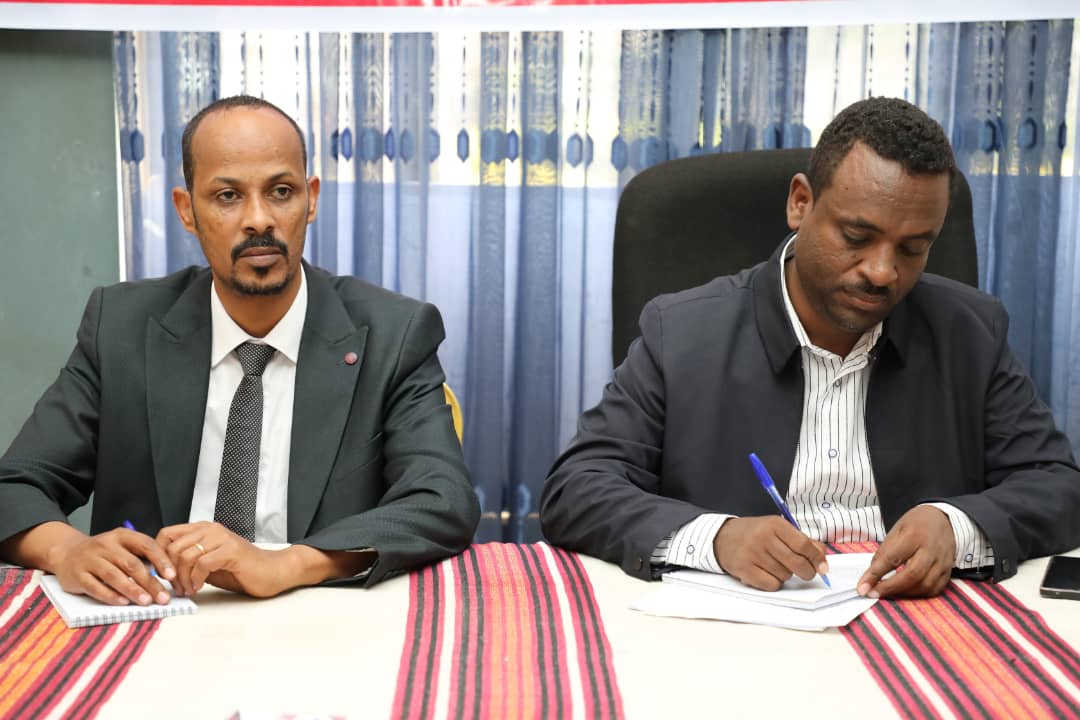Making a difference: COWASH IV MHM Training Program in Oromia
In rural communities, girls’ education is often disrupted by various factors, including a simple lack of access to menstrual hygiene products. A dedicated teacher named Lemelem Ashagere is working to address this challenge in Oromia.
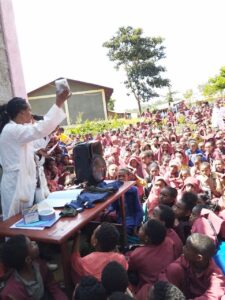 Lemlem who is also the Gender Club head at East Welega Horda Dongi Primary School, is making a significant difference in the lives of young girls. With training from COWASH IV’s Menstrual Hygiene Management (MHM) program, Lemlem is empowering students by teaching them about menstrual hygiene and how to make reusable sanitary pads and underwear.
Lemlem who is also the Gender Club head at East Welega Horda Dongi Primary School, is making a significant difference in the lives of young girls. With training from COWASH IV’s Menstrual Hygiene Management (MHM) program, Lemlem is empowering students by teaching them about menstrual hygiene and how to make reusable sanitary pads and underwear.
At the end of the Ethiopian fiscal year 2016, Lemlem along with the school director and a student from her school, attended a COWASH IV MHM and reusable sanitary pad and underwear trainers training program in Adama City. Since then, Lemlem and her team, with the support of the Oromia Education Bureau, one of the key partners of COWASH IV in the region, have been actively training teachers and students in their school. This initiative, beyond raising awareness about menstrual hygiene, has also helped to break down stigmas surrounding menstruation.
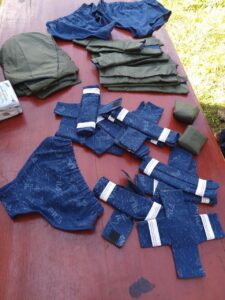
The training program in the school has also addressed the challenge of affordability by teaching students to make their own reusable sanitary pads and underwear. Lemlem says one of the challenges for many girls in her school has been the high cost of sanitary pads. However, with the skills they have learned through this training, some of her students are now able to produce their own reusable pads ensuring they have access to hygienic menstrual products. Lemlem and her team has already trained 537 students and aims to expand their reach to other schools and communities.
Beyond the MHM training, COWASH IV has supported Horda Dongi Primary School by constructing MHM center, a water supply point and improved latrines, providing a safe and hygienic environment for students and teachers. By facilitating safe WASH access in schools, health centers, and rural communities, COWASH IV is working to empower the future generation and ensure safe WASH for all.
Building local capacity: COWASH IV concluded on-the-job training programs in Tigray
COWASH IV concluded three on-the-job training programs in Tigray Region from October 27 to November 1st 2024. These programs aimed to strengthen the capacity of local stakeholders in Tahtay Maychew and Afherom Woredas.
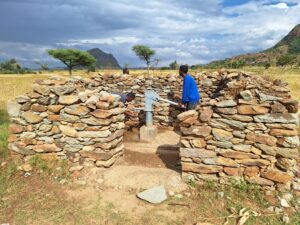 The training programs covered effective implementation of the community-managed project (CMP) approach, risk assessment and management for water supply systems and data collection, management and reporting.
The training programs covered effective implementation of the community-managed project (CMP) approach, risk assessment and management for water supply systems and data collection, management and reporting.
The training sessions were held at woreda offices and community water points, providing practical insights. Around 31 experts from regional and woreda level offices including water supply beneficiaries, COWASH IV supervisors and focal persons participated in the training.
Yohannes Melaku, a CMP specialist at COWASH IV, said the on-the-job training programs will strengthen the capacity of stakeholders to effectively implement the CMP and institutional WASH approaches in the Ethiopian Fiscal Year 2017 by addressing the gaps identified on the implementation process. Abebaw Getachew, COWASH IV’s Monitoring and Evaluation specialist, added that the training programs will also equip the stakeholders with the knowledge to build sustainable WASH infrastructure as well as collect timely and reliable data and improved its management.”
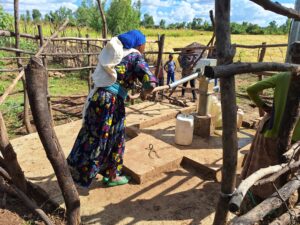 In the coming months, COWASH IV’s regional support unit will cascade the training to other woredas and the federal team will conduct follow-up visits to assess the impact and address any challenges.
In the coming months, COWASH IV’s regional support unit will cascade the training to other woredas and the federal team will conduct follow-up visits to assess the impact and address any challenges.
These on-the-job training programs aimed to ensure consistent, timely and reliable data collection, management and reporting, effective community-managed project approach implementation as well as building water safety systems as per the standard in turn ensuring sustainable WASH supply.
COWASH IV Strengthens WASH SLAs through on-the-job training sessions
COWASH IV is currently conducting on-the-job training sessions in Bale Zone, Oromia Region, to establish and strengthen Water, Sanitation, and Hygiene (WASH) Saving and Loan Associations (SLAs).
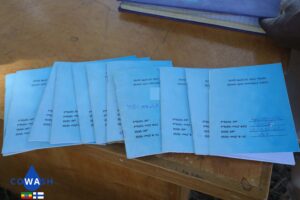 From October 29th to 31st, the COWASH IV team is in Dinsho and Goba Woredas, training community water scheme beneficiaries, WASH Committees, SLA groups, and regional, Woreda, and Kebele level stakeholders on SLA establishment and sustainability. In Dinsho, the focus is on establishing new SLA groups, while in Goba, the team is providing supervision training to existing groups to ensure their continued progress and sustainability.
From October 29th to 31st, the COWASH IV team is in Dinsho and Goba Woredas, training community water scheme beneficiaries, WASH Committees, SLA groups, and regional, Woreda, and Kebele level stakeholders on SLA establishment and sustainability. In Dinsho, the focus is on establishing new SLA groups, while in Goba, the team is providing supervision training to existing groups to ensure their continued progress and sustainability.
Last week, similar training sessions were conducted in Central Ethiopia and South-West Ethiopia People’s Region. In Lemu, Geta, and Fofa Woredas of the Central Ethiopia region, 51 participants, including health extension workers, took the training. In South-West Ethiopia, training was provided for SLA groups in Mari Mansa and Kechi Woredas, focusing on increasing savings, accurate record-keeping, and investing savings in improved household sanitation.
Through these trainings, COWASH IV aims to establish strong and sustainable SLA groups, promote behavior change in sanitation practices, strengthen WASH committees and their collaboration with SLAs as well as cascade the project’s WASH SLA methodology to Kebele WASH teams, health extension workers, and WASH Committees.
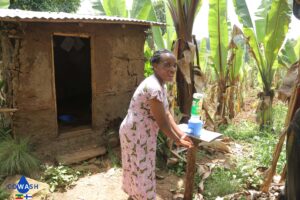
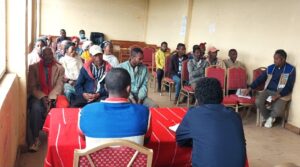
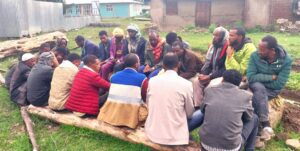
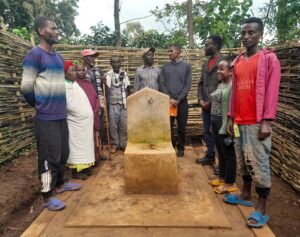
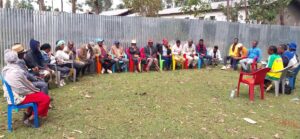
Simple Handwashing Saves Lives: Promoting Handwashing Practice in Rural Ethiopia
Simple Handwashing Saves Lives: Promoting Handwashing Practice in Rural Ethiopia
Every year, the world celebrates Global Handwashing Day to highlight the importance of this simple yet effective practice in preventing the spread of diseases. In rural Ethiopia, where access to basic hygiene services is limited, inadequate handwashing poses significant health risks, particularly among children. On this year’s Global Handwashing Day, we explore the importance of handwashing and how COWASH IV is contributing to improved handwashing practices in these communities.
Why are clean hands important?
Handwashing with soap is a simple yet effective way to prevent a range of diseases and the spread of infections. As Amarech Zemede, a health extension worker at Untelo Health Post in Gacho Baba Woreda, one of COWASH IV’s project areas in South Ethiopia, emphasizes, handwashing is a cost-effective and essential practice for protecting ourselves from diseases caused by poor hygiene. Studies also show that handwashing with soap can reduce diarrheal diseases by 30% and acute respiratory infections by up to 20%.
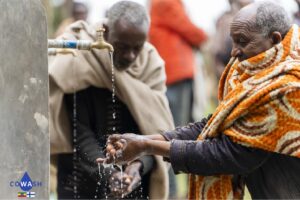 Moreover, proper hand hygiene is linked to various benefits including reduced school absenteeism, improved wellbeing, dignity and productivity. Yerom Demisse, a health extension worker at Zemeten Health Post in Dejen, another project woreda of COWASH IV in Amhara Region, shares that handwashing has contributed to improved school attendance in her community. She says “children were previously absent due to poor hygiene and frequent visits to the health post.”
Moreover, proper hand hygiene is linked to various benefits including reduced school absenteeism, improved wellbeing, dignity and productivity. Yerom Demisse, a health extension worker at Zemeten Health Post in Dejen, another project woreda of COWASH IV in Amhara Region, shares that handwashing has contributed to improved school attendance in her community. She says “children were previously absent due to poor hygiene and frequent visits to the health post.”
Handwashing is also part of the Sustainable Development Goals where promoting high levels of hand hygiene practices can contribute to their achievement.
Despite its importance, handwashing practices in rural communities remain at an early stage and require further attention. Ebsa Feyisa, COWASH IV’s social and behavioral change specialist, notes that even with those communities who have handwashing facilities, the availability of soap is a significant challenge.
COWASH IV: Promoting handwashing in rural Ethiopia
One of the focus areas of COWASH IV, a bilateral project between Ethiopia and Finland, is to improve handwashing practices in rural communities. The project promotes handwashing through three key initiatives: demand creation, developing and an enabling environment and financial and supply access.
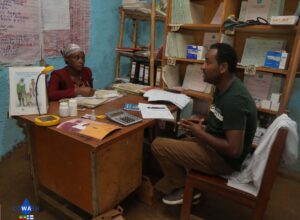 According to Ebsa, while awareness of handwashing has increased, there is still a gap in applying this knowledge due to negligence and beliefs that discredit its importance. COWASH IV is implementing different social and behavioral change programs to address these challenges and promote handwashing. Among others, the project provides training programs and supervision support to health extension workers to influence communities and reinforce positive behavior. Particularly the on-the-job training program for health extension workers and other stakeholders makes COWASH IV’s intervention unique.
According to Ebsa, while awareness of handwashing has increased, there is still a gap in applying this knowledge due to negligence and beliefs that discredit its importance. COWASH IV is implementing different social and behavioral change programs to address these challenges and promote handwashing. Among others, the project provides training programs and supervision support to health extension workers to influence communities and reinforce positive behavior. Particularly the on-the-job training program for health extension workers and other stakeholders makes COWASH IV’s intervention unique.
Amarech highlights this instrumental role of the project in supporting her team’s effort to raise awareness and promoting handwashing in her community. Her team implement various activities to encourage handwashing, including house-to-house visits, school-based interventions and teaching at various community events. She says the project’s training programs and supervision support for health extension workers have been crucial in enabling them to effectively deliver these works. These combined efforts have led to a noticeable improvement in the community’s hygiene practices, particularly among children, says Amarech.
Yerom agrees with Amarech expressing her joy to observe a positive change in her community. “Many children used to visit our health post due to illnesses related to poor hygiene and we would often carry oral rehydration therapy and zinc during our house-to-house visits” shares Yerom. However, the situation has improved, with fewer people reporting similar problems to her health post following the interventions. For Yerom, the project’s work in providing communities with safe water supply along the training programs has played a crucial role in promoting handwashing.
COWASH IV is also promoting handwashing through communication interventions that aimed at ensuring practical implementation. The project has developed and disseminated posters that raise awareness and promote handwashing in public service areas such as health posts, schools and Kebele administrations. Additionally, the project has produced and distributed audio and video messages through social media, available websites, local TV stations and radio channels. These educational materials are available in three local languages: Amharic, Afan Oromo and Sidaamu Afoo.
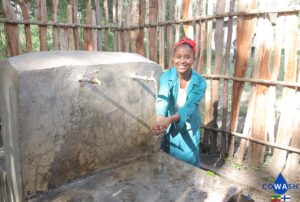 COWASH IV’s second intervention area aims to create an enabling environment. The project collaborates with partners at various levels, from national to kebele, to establish an enabling environment for handwashing promotion. This involves participating in developing roadmaps and guidelines at the national level and providing support to government systems, including the health extension program.
COWASH IV’s second intervention area aims to create an enabling environment. The project collaborates with partners at various levels, from national to kebele, to establish an enabling environment for handwashing promotion. This involves participating in developing roadmaps and guidelines at the national level and providing support to government systems, including the health extension program.
COWASH IV also provides comprehensive WASH interventions in schools and health posts. In addition to constructing water schemes and improved latrines, the project has built dedicated handwashing facilities in schools and health posts. These efforts, combined with awareness-raising activities, encourage students to wash their hands and influence their families.
Million Wolde Giyorgis, a health extension worker at Wegencho Kebele Health Post in Yezm Zone, Central Ethiopia, highlights the positive impact of a water point constructed by COWASH IV in 2015. Prior to the water point, the lack of clean water made daily tasks, such as handwashing for procedures like inserting birth control implants, significantly more challenging.
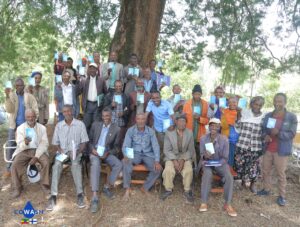 The third focus area of COWASH IV’s handwashing intervention is creating financial and supply access for rural communities. To achieve this, the project is establishing market-based sanitation centers and facilitating the establishment of WASH savings and loan associations (SLAs). The sanitation centers offer affordable sanitation supplies, including liquid soap. WASH SLAs, on the other hand, provide communities with financial access to purchase and install handwashing facilities along with improve household latrines.
The third focus area of COWASH IV’s handwashing intervention is creating financial and supply access for rural communities. To achieve this, the project is establishing market-based sanitation centers and facilitating the establishment of WASH savings and loan associations (SLAs). The sanitation centers offer affordable sanitation supplies, including liquid soap. WASH SLAs, on the other hand, provide communities with financial access to purchase and install handwashing facilities along with improve household latrines.
Demissie Menegesha, a resident of Chirone Woreda, where COWASH IV established a market-based sanitation center, highlights the positive impact of the centers in providing high-quality soap at an affordable price which in turn is improving handwashing practice.
Handwashing is a simple yet powerful tool in preventing diseases and improving health outcomes in rural Ethiopia. COWASH IV’s comprehensive approach, which includes demand creation, financial and supply access, and an enabling environment, is making a significant impact. By addressing challenges and promoting behavior change, COWASH IV is helping to ensure that clean hands save lives in rural communities.
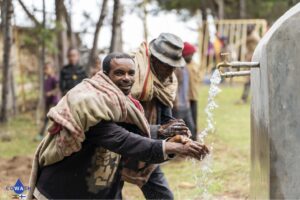
COWASH IV Conducts Targeted Training Programs to Strengthen WASH Enterprises and Financial Access
COWASH IV has successfully concluded two training programs in the Tigray region earlier this month aimed at revitalizing the local WASH sector. The training sessions focused on strengthening WASH enterprises and expanding financial access for the construction of improved household latrines within rural communities.
Strengthening WASH Enterprises
In Ende Mekoni Woreda, the project conducted an on-the-job training program on October 2, 2024 for two re-established medium and small-scale enterprises. These enterprises, Komah and Mehiret market-based sanitation center and Maregu and Gebre Samuel water scheme construction, maintenance and operation service provider, received training in market development.
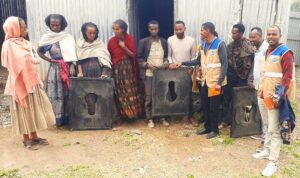 Mulatie Yinger, a medium and small-scale enterprise and microfinance institutions specialist at COWASH IV, emphasized the unique nature of this training as it focused on water scheme maintenance service delivery. He says “our goal is to ensure the sustainability of community water schemes by facilitating the easy availability of maintenance services and affordable sanitation products.” And these training programs, according to Mulatie, are a key component of COWASH IV’s medium and small-scale enterprises initiative that plays a crucial role in supporting these enterprises to recover, expand their businesses and diversify their service delivery.
Mulatie Yinger, a medium and small-scale enterprise and microfinance institutions specialist at COWASH IV, emphasized the unique nature of this training as it focused on water scheme maintenance service delivery. He says “our goal is to ensure the sustainability of community water schemes by facilitating the easy availability of maintenance services and affordable sanitation products.” And these training programs, according to Mulatie, are a key component of COWASH IV’s medium and small-scale enterprises initiative that plays a crucial role in supporting these enterprises to recover, expand their businesses and diversify their service delivery.
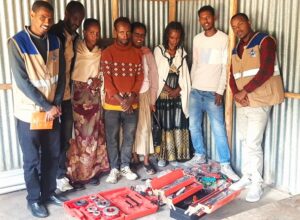 Amanuel Wendyeferaw, COWASH IV’s CMP Advisor in Ende Mekoni Woreda, also emphasizes the crucial role of the training programs in revitalizing the WASH sector in the region following the conflict. He says the conflict has disrupted access to essential services, including water scheme maintenance. As a result, the project focused on providing maintenance services to community water points and the ongoing training programs have been instrumental in ensuring the effective delivery of these services.
Amanuel Wendyeferaw, COWASH IV’s CMP Advisor in Ende Mekoni Woreda, also emphasizes the crucial role of the training programs in revitalizing the WASH sector in the region following the conflict. He says the conflict has disrupted access to essential services, including water scheme maintenance. As a result, the project focused on providing maintenance services to community water points and the ongoing training programs have been instrumental in ensuring the effective delivery of these services.
With the support provided by COWASH IV, Maregu and Gebre Samuel water scheme construction, maintenance and operation service provider has been actively engaged in maintaining these water points. In the past Ethiopian fiscal year, the enterprise successfully serviced 22 community water points and obtained a grade 11 construction license from the Woreda Medium and Small-scale Enterprises office. This license enabled the enterprise to participate in construction bidding for projects with a value up to 660,000 Birr.
Facilitating Financial Access for Household Sanitation Facilities
On October 3, 2024 COWASH IV provided another training workshop in Degua Temben Woreda on establishing WASH saving and loan associations. This initiative empowers communities to take ownership of their WASH needs by creating financial access dedicated to improving household latrines.
Through these targeted training programs, COWASH IV is actively contributing to revitalizing the WASH sector in the region and ensuring its long-term sustainability.
COWASH IV’s Post-Conflict Recovery Efforts
Following the peace agreement in Tigray, COWASH IV was the first project to bring WASH finance to the region. Recognizing the urgent need for post-conflict recovery, the project mainly focused on rehabilitation and capacity building across its 12 project woredas.
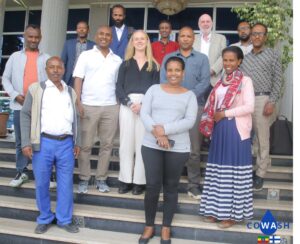 In this regard, one of COWASH IV’s key initiatives has been supporting the revitalization of medium and small-scale enterprises established before the conflict. Through an assessment conducted earlier this year in four Woredas, COWASH IV identified the specific support needed to enable these enterprises to fully function and diversify their service delivery. The project provided comprehensive support, including technical assistance and financial aid in the form of spare parts for maintenance valued at 100,000 Birr.
In this regard, one of COWASH IV’s key initiatives has been supporting the revitalization of medium and small-scale enterprises established before the conflict. Through an assessment conducted earlier this year in four Woredas, COWASH IV identified the specific support needed to enable these enterprises to fully function and diversify their service delivery. The project provided comprehensive support, including technical assistance and financial aid in the form of spare parts for maintenance valued at 100,000 Birr.
In the past Ethiopian fiscal year, COWASH IV successfully re-established six enterprises and established one new enterprise operating in the WASH sector in Tigray. Looking ahead, the project is planning to provide comprehensive business development services that includes training programs, financial and market linkage support. Beyond Tigray, the project is also working to establish and strengthen similar enterprises in other project regions, demonstrating its commitment to empowering communities throughout rural Ethiopia.
COWASH IV Sidama Regional Support Unit Concludes Successful Progress Review and Planning Workshop
The COWASH IV Sidama Regional Support Unit concluded a successful Ethiopian Fiscal Year (EFY) 2016 progress review and EFY 2017 plan workshop. Representatives from regional sector bureaus as well as officials, COWASH IV Community Managed Project approach advisors, and focal persons from the five project woredas participated in the workshop held from September 30 to October 1, 2024.
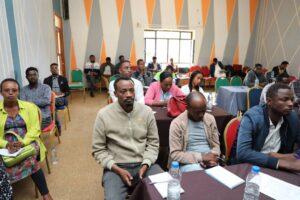 Arareso Geremew (PhD), the Regional Steering Committee chairperson and Sidama Regional Finance Administration Bureau Head, emphasized the significant contributions of the COWASH IV project to the WASH sector in his opening speech.
Arareso Geremew (PhD), the Regional Steering Committee chairperson and Sidama Regional Finance Administration Bureau Head, emphasized the significant contributions of the COWASH IV project to the WASH sector in his opening speech.
The project’s progress report, which detailed key achievements and challenges, was presented and discussed. Engineer Kebede Ganole, the Sidama Regional Water, Mines, and Energy Bureau Head, highlighted the successful implementation of safe water supply efforts in the project and expressed optimism for similar outcomes in the sanitation sector in the coming year.
During EFY 2016, the project constructed and rehabilitated 70 community water supply points, benefiting over 31,000 rural people. Additionally, the project constructed and rehabilitated 19 school water supply points, 13 water schemes in health institutions, and improved latrines in four schools and menstrual hygiene management facilities in two schools.
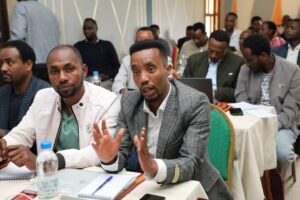 The workshop also focused on the project’s plans for 2017, which include constructing 107 community water schemes and reaching over 43,000 people with safe water. Participants committed to maintaining effective practices and addressing gaps and challenges. Woreda officials in turn pledged to provide necessary support and to facilitate timely contributions from the government’s matching fund.
The workshop also focused on the project’s plans for 2017, which include constructing 107 community water schemes and reaching over 43,000 people with safe water. Participants committed to maintaining effective practices and addressing gaps and challenges. Woreda officials in turn pledged to provide necessary support and to facilitate timely contributions from the government’s matching fund.
At the conclusion of the workshop, the COWASH IV project team expressed gratitude for the ongoing support of its partners and expressed confidence in building upon its achievements in the coming year.


